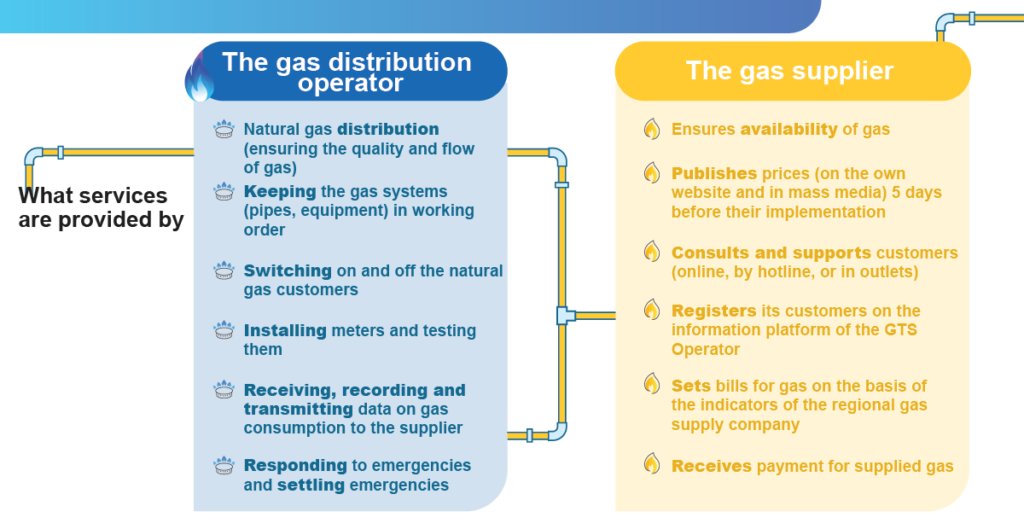A few years ago, Ukrainians received two gas bills for the first time and learned about the next stage of gas market reform – the separation of gas distribution operators from suppliers. What has changed, apart from the number of bills, and who is responsible for them?
Each gas customer receives two services – distribution (delivery) and supply (sale). The first one is provided by the operator of gas and gas-supply systems (regional or municipal gas company), the second one is provided by the supplier or the gas supply company.
There are more than 40 distribution operators in Ukraine and each is a natural monopoly in its region. And there are many more gas suppliers – hundreds for enterprises and nearly 70 for the population.

What is the responsibility of the gas distribution network operator (GDN)?
Each region of Ukraine is served by specialized licensed companies. Since there are no alternatives to networks in the region, these companies are recognized as natural monopolies and their activities are controlled by the regulator – the National Commission, which carries out state regulation in the field of energy and public services (NERCEP), and the Antimonopoly Committee of Ukraine (ACU). The Committee ensures that the regional state administration does not encroach on the monopoly, while NERCEP sets tariffs for all services provided by the gas distribution network operator and takes its costs into account.
What services are provided by the operator of GDN:
- natural gas distribution (ensuring the quality and flow of gas),
- keeping the gas systems (pipes, equipment) in working order,
- switching on and off natural gas customers (provides technical conditions, performs works),
- installing meters and testing them,
- receiving, fixing and transmitting data on gas consumption to the supplier,
- charging for distribution (delivery) of gas,
- responding to emergencies and resolving emergencies.
This means that the operator of the GDN is responsible for the physical part of gas supply – from the connection of the house to the gas metering.
In order to perform their service duties, the staff of the GDN operator have the right to free and uncomplicated access to the territory and land plot of the consumer where the gas and gas supply system are located and the consumer’s gas equipment and meter in accordance with the legislation and the distribution agreement.
What is the gas supplier responsible for?
The gas supplier is responsible for the availability of gas as a commodity. The supplier ensures the connection between the producer and the purchaser.
The main duties of the supplier to its customers:
- ensure uninterrupted gas supply (ensure that there is enough gas for their customers),
- publish prices (on its own website and in mass media) five days before their implementation,
- consultations and customer support (online, by hotline, or in outlets),
- register its customers on the information platform of the GDN Operator, and ensure timely document exchange,
- book and pay for the capacity of the high-pressure gas transmission system,
- creating financial security for the GTS Operator,
- issue a bill for gas on the basis of indicators of the regional gas supply company and others.
If the supplier cannot continue supplying gas to its customers, it is obliged to notify its customers within three days before the termination of services and inform them about the right to transfer to another supplier. Also, the provider must inform the client about the possibility of reimbursement of losses, which the customer incurred due to the provider’s failure to fulfill its obligations.
Supplier of last hope
The rules of the Ukrainian gas market require the presence of a “last hope” supplier (LHS), a separate security mechanism. If something happens to the regular gas supplier, as a result of which it cannot provide its customers with gas, they begin to receive gas from the supplier of the “last hope” (LHS).
According to the law, customers automatically become customers of LHS, if:
- the provider is bankrupted or was liquidated;
- the supplier’s license is suspended or revoked;
- the customer is not listed in the customer register (no supply contract was concluded with any supplier).
The LHS is a time-based protection mechanism, so gas from the LHS can be received only for a limited period of time – up to 60 days.
LHS has to be the most reliable company on the market, because it can serve any number of customers at any moment. That is why there are serious requirements for such a company in Ukraine, which perform the duties of the LHS: the company must have enough funds or gas on hand to satisfy the highest monthly volume of gas consumption by all consumers of Ukraine during the heating season.
